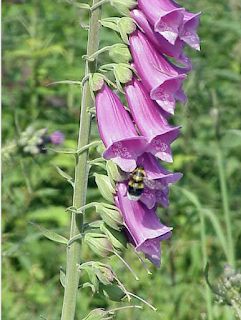 |
| Foxglove |
Digitalis is a genus of about 20 species of herbaceous perennials, shrubs, and biennials commonly called foxgloves. The best-known species is the common foxglove, Digitalis purpurea. This biennial plant is often grown as an ornamental plant due to its vivid flowers which range in colour from various purple tints through pink, and purely white. The term digitalis is also used for drug preparations that contain cardiac glycosides, particularly one called digoxin, extracted from various plants of this genus. Foxglove has medicinal uses but can also be toxic to humans and other animals. (Wikipedia)
Ottawa announces 'unprecedented action' to protect Fraser River chinook
Expanded fishing closures and size restrictions are part of new actions announced by the federal government to protect threatened Fraser River chinook salmon. Terry Beech, parliamentary secretary to the fisheries minister, says large areas of the ocean near the mouth of the Fraser River will be closed to fishing and chinook that are more 80 centimetres long must be released. He says they're taking the unprecedented action because of historic low populations of chinook salmon, which are the favoured food of endangered southern resident killer whales. (CBC)
Whatcom jobs, families depend on an open U.S.-Canada border. Here’s the summer outlook
Fully reopening the U.S.-Canadian border is going to take time, and it will be even longer before cross-border shopping and visits recover. That’s one of the assessments made by a group of panelists during a Western Washington University presentation held via Zoom on Friday, June 19. Three experts talked about the future of the border in the presentation, which was moderated by Laurie Trautman, director at Western’s Border Policy Research Institute. Dave Gallagher reports. (Bellingham HeraldO\)
Tracking The Sound Of The Spotted Owl's Extinction
The spotted owl changed the fate of Northwest forests in the summer of 1990. Thirty years later, what hope, if any, do biologists hold for the fate of the spotted owl? Ian McCluskey writes. (OPB)
Citizen scientists fan out to identify, photograph local butterflies
A growing army of 200 citizen scientists will deploy across the Lower Mainland starting Monday, hoping to find and document local butterflies. The effort is part of National Pollinators Week and sponsored by the David Suzuki Foundation. It's part of the BIMBY program — short for butterflies in my backyard. According to project lead Winnie Hwo, volunteers were already busy in April, planting butterfly-friendly native plants to build a network or "butterflyway" that also supports birds and bees. (CBC)
‘Exploding Whale’ Park Memorializes Blubber Blast 50 Years Later
Residents of a coastal Oregon city voted to name a park for a 1970 explosion that rained chunks of rotting whale flesh on curious bystanders. Bryan Pietsch reports. (NY Times)
But does cuteness count? A cost-benefit analysis of sea otters encourages Oregon return backers
A study of sea otter restoration in British Columbia is giving encouragement to a group that wants to bring sea otters back to the Oregon Coast. A research report in the June 12 issue of the journal Science found that the return of sea otters yields far more in ecological benefits and ecotourism dollars than in costs to commercial fisheries. The research team led by the University of British Columbia analyzed the rebound in sea otters off the coast of Vancouver Island. The researchers wrote that the return of the keystone species from near-extinction resulted in healthier kelp forests, which in turn could store carbon and spur increased fish populations and catches. Tom Banse reports. (NW News Network)
Trump’s toxic torrent of environmental rollbacks impedes social justice
At this point, it shouldn’t come as a surprise to anyone that the White House is pursuing a massive rollback of our nation’s environmental protections. Given everything going on in the world today, many people probably don’t realize that the most critical — and most egregious — of these rollbacks has been finalized just in the last three months. To put it bluntly, while our country wrestles with a devastating disease outbreak, a debilitating economic crisis, and an outpouring of anger and grief over racial injustice, the U.S. Environmental Protection Agency and other federal agencies have quietly burned the midnight oil to complete a march of policies certain to worsen our health, damage our environment and leave a toxic legacy for our children. Laura Watson writes. (Seattle Times)
Now, your tug weather--
West Entrance U.S. Waters Strait Of Juan De Fuca- 249 AM PDT Mon Jun 22 2020
TODAY W wind to 10 kt becoming NW in the afternoon. Wind waves 1 ft or less. W swell 3 ft at 10 seconds.
TONIGHT W wind 5 to 15 kt becoming to 10 kt after midnight. Wind waves 2 ft or less. W swell 4 ft at 9 seconds.
--
"Salish Sea News & Weather" is compiled as a community service by Mike Sato. To subscribe, send your name and email to msato (@) salishseacom.com. Your email information is never shared and you can unsubscribe at any time.
Salish Sea News: Communicate, Educate, Advocate
Follow on Twitter.
Salish Sea Communications: Truth Well Told
This comment has been removed by a blog administrator.
ReplyDelete